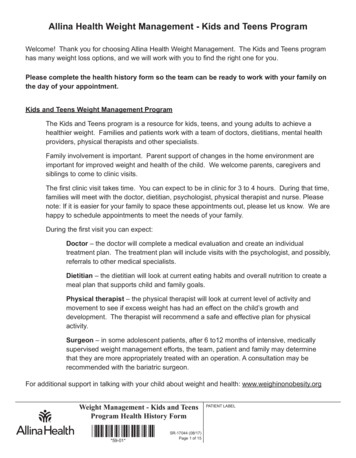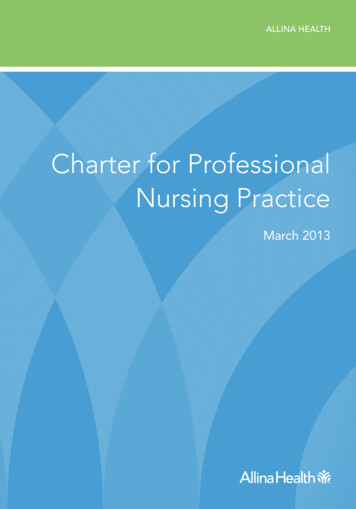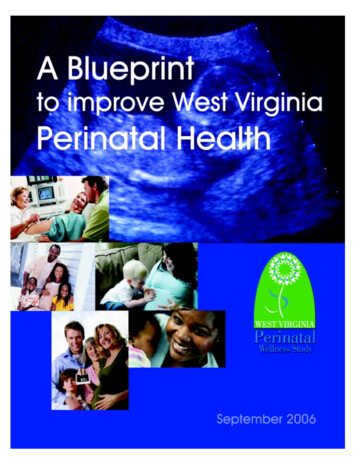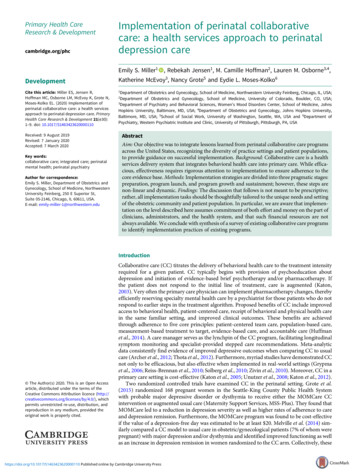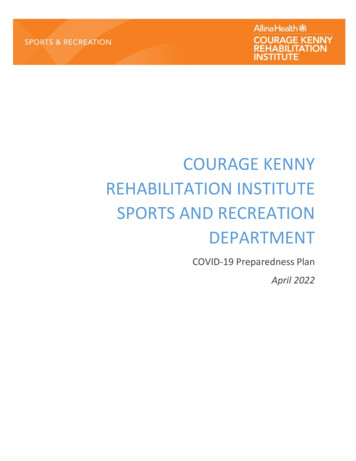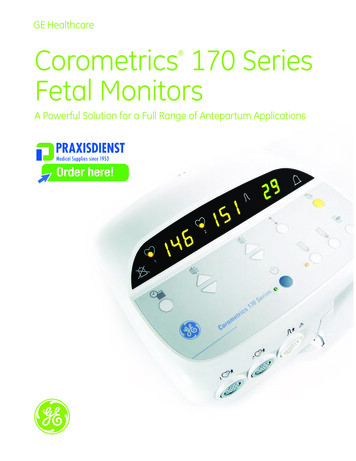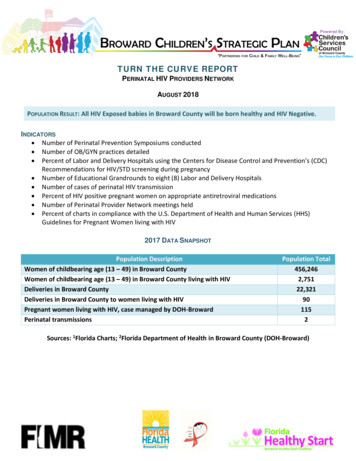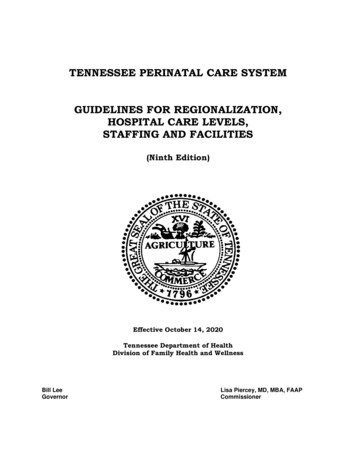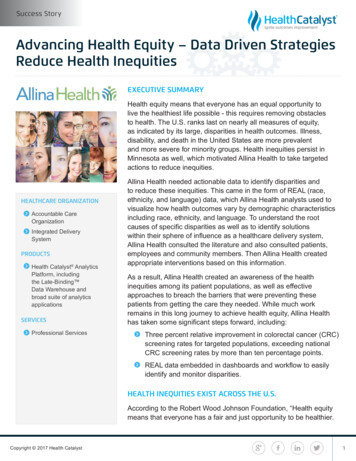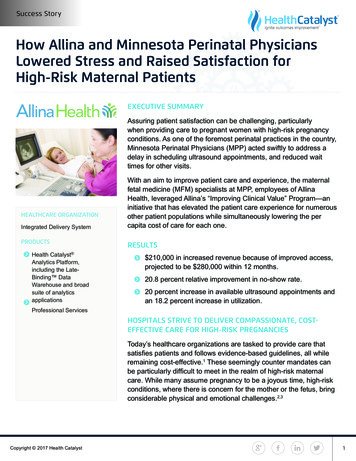
Transcription
Success StoryHow Allina and Minnesota Perinatal PhysiciansLowered Stress and Raised Satisfaction forHigh-Risk Maternal PatientsEXECUTIVE SUMMARYAssuring patient satisfaction can be challenging, particularlywhen providing care to pregnant women with high-risk pregnancyconditions. As one of the foremost perinatal practices in the country,Minnesota Perinatal Physicians (MPP) acted swiftly to address adelay in scheduling ultrasound appointments, and reduced waittimes for other visits.HEALTHCARE ORGANIZATIONIntegrated Delivery SystemPRODUCTSWith an aim to improve patient care and experience, the maternalfetal medicine (MFM) specialists at MPP, employees of AllinaHealth, leveraged Allina’s “Improving Clinical Value” Program—aninitiative that has elevated the patient care experience for numerousother patient populations while simultaneously lowering the percapita cost of care for each one.RESULTSCatalyst HealthAnalytics Platform,including the LateBinding DataWarehouse and broadsuite of analyticsapplications 210,000 in increased revenue because of improved access,projected to be 280,000 within 12 months.20.8 percent relative improvement in no-show rate.20 percent increase in available ultrasound appointments andan 18.2 percent increase in utilization.Professional ServicesHOSPITALS STRIVE TO DELIVER COMPASSIONATE, COSTEFFECTIVE CARE FOR HIGH-RISK PREGNANCIESToday’s healthcare organizations are tasked to provide care thatsatisfies patients and follows evidence-based guidelines, all whileremaining cost-effective.1 These seemingly counter mandates canbe particularly difficult to meet in the realm of high-risk maternalcare. While many assume pregnancy to be a joyous time, high-riskconditions, where there is concern for the mother or the fetus, bringconsiderable physical and emotional challenges.2,3Copyright 2017 Health Catalyst1
Minnesota Perinatal Physicians (MPP) is very familiar with thisdynamic. One of the largest perinatal practices in the nation, MPPoffers comprehensive diagnostic services and medical/surgical carefor a full range of fetal abnormalities, maternal health concerns, andcomplications of pregnancy. Outpatient services are available at sixclinic locations in the Minneapolis/St. Paul area.When data showed we fellshort of our commitmentto schedule patients forultrasounds within 48hours, we knew this wasan opportunity to improvecare and access on abroader level.Doug ThorsonInterim Vice President of OperationsMother Baby Service LineMPP’s team of 13 MFM specialists are employed by Allina Health, anot-for-profit integrated health care delivery system. These specialistswork together with four advanced practice nurses to manage highrisk pregnancy conditions and reduce possible complications forwomen who are of advanced maternal age; have been diagnosedwith a chronic condition such as lupus, diabetes, or hypertension;are carrying a baby with abnormalities or syndromes; have had aprevious pregnancy loss; or are at risk of delivering prematurely.This success story describes how MPP increased maternal patientsatisfaction and practice revenue by following Allina’s “ImprovingClinical Value" Program—an initiative that has elevated the patientcare experience for numerous other patient populations whilesimultaneously lowering the per capita cost of care for each one. Theprogram engages employees and physicians in decreasing clinicalvariation for improved outcomes and reducing unnecessary costs topatients, communities, and Allina Health. Improving Clinical Valuealigns the entire organization behind clinically driven work to achievethe best outcomes and care for patients, requires a multi-disciplinaryteam across the entire system, including physicians, bedside nurses,pharmacy, supply chain, finance and clinical analytics. To achievethe desired outcomes and create value that can be differentiated,Improving Clinical Value requires support from hospitals, clinics,clinical service lines, home care services, network integration andsystem office. The Improving Clinical Value Program reliably supportsleaders in identifying opportunities for improvement that positivelyimpact the patient and the organization, and includes a process toassess the value of these improvements prior to initiating them.ROOM FOR IMPROVEMENT IN HIGH-RISK MATERNAL CAREEach year, Allina and MPP identify opportunities to improve accessto care, patient satisfaction, and financial performance. As part ofthis ongoing commitment to improving clinical value, operationalleaders at MPP analyzed the clinical workflows at each of their sixoutpatient clinics. Key findings revealed:Three to four-week delay time in scheduling of ultrasoundappointments.Copyright 2017 Health Catalyst2
Patient dissatisfaction with lengthy wait times during the visit.Patient anxiety leading up to and during the visit; in part, due toexcessive wait times.As a practice that is committed to providing comprehensive,patient-centered, seamless care, MPP was determined to changethis unsatisfactory state. Accordingly, MPP set out to redesignwork flows and use available resources in the most effective way,with the goal of giving high-risk maternal patients exceptionalexperiences—and outcomes.DATA-DRIVEN CHANGES IMPROVE CLINICAL VALUETo reduce wait times and make other improvements for patients, MPPfollowed Allina’s Improving Clinical Value Program. The program issupported by the Health Catalyst Analytics Platform, which includesa Late-Binding Data Warehouse and broad suite of analyticsapplications that aggregate data from a variety of sources—fromclinical to operational to financial. Access to such robust data setsinforms Allina’s decisions associated with the Improving ClinicalValue Program, and facilitates ongoing measurement of improvementefforts. Likewise, this meaningful data, paired with direct observationof clinic workflows, informed MPP’s own subsequent plan to makeultrasound appointments more timely and reduce wait times for visits.Improving patient access and throughput. The appropriatelength for an ultrasound appointment can vary; for some patients, a30-minute appointment is adequate, while others require up to twohours. While this variation is clinically appropriate, it complicatesscheduling. To that end, MPP expanded appointment availability, withphysician support, by adding a 7:30 a.m. appointment slot. MPP alsoleveraged idle ultrasound equipment to add two more ultrasoundrooms. Through these two changes, MPP added 18 ultrasoundappointments per week, without an increase in operational expenses.Smarter allocation of resources. MPP also optimized the resourcescheduling framework to reduce patient wait times, which wouldgreatly improve the overall patient experience. Specifically, MPPadjusted appointment block times for the genetics counselor, andimplemented automated appointment reminder calls to reducepatient no-shows.Patient wait times. Previously, the mother and her significantother would first be seen by the genetic counselor and thenwait to conclude their visit or proceed to their next appointmentwhile the genetic counselor completed activities such ascommunication with other facilities and providers and review ofCopyright 2017 Health Catalyst3
patient information. MPP identified that the patient experiencecould be improved by allowing the patient to conclude herappointment as soon as the face-to-face time with the geneticscounselor was complete. This allows the patient to either moveon to the next appointment scheduled during the same day, orconclude the clinic visit.No-shows. To reduce no-shows, which lead to longer delaysfor patients waiting for an available appointment to be seenand waste important clinic resources, MPP implementedautomated “appointment reminder” phone calls to patients.Frontline staff educationand support has been keyto our success. Our staffare being asked to do theirwork differently, but arewilling to do so becausethey are able to see thebenefit to the patient.Tess Jentink, BSN, RNPractice ManagerLastly, MPP partnered with clinical documentation improvementspecialists to provide physician education and support in improvingboth the accuracy and specificity of provider documentation. Thishelps make certain that data in the medical record adequatelyrepresents the patient’s clinical picture.RESULTSIn just nine months, MPP measurably improved clinical valuefor high-risk maternal patients—expanding their access to care,increasing their satisfaction, while elevating the practice’s financialperformance. These impressive improvements include: 210,000 in increased income because of improved access,projected to be 280,000 within 12 months.20.8 percent relative improvement in the no-show rate, with anestimated 89,540 in annual savings.The automated reminder phone calls have reduced thepercentage of patients who fail to show for theirscheduled appointment.20 percent increase in available ultrasound appointments, and18.2 percent increase in utilization, resulting in 2,253 additionalultrasounds performed when compared to the previous year.20 percent reduction in wait time, while increasing the numberof unique patients by 6.4 percent.WHAT’S NEXTSuch notable results have reaffirmed MPP’s commitment to improveclinical value and provide comprehensive, patient-centered, seamlesscare for high-risk pregnancies. MPP is assessing future opportunitiesto provide even better care and experiences for individuals, betterhealth for the population, while reducing per capital costs of care.Copyright 2017 Health Catalyst4
REFERENCES1. Ricci, P., McGrath, R., & Stransky, M. (2014). Patient satisfaction andultrasound use during pregnancy. Retrieved from 76.php?aid 239132. Byatt, N., Hicks-Courant, K., Davidson, A., Levesque, R., Mick, E., Allison,J., & Moore Simas, T. A. (2014). Depression and anxiety among high-riskobstetric inpatients. General hospital psychiatry, 35(2):112-116.3. The American Congress of Obstetricians and Gynecologists: Women's HealthCare Physicians. (2013). Depression, anxiety rates high among hospitalizedpregnant women on bed rest. Retrieved from alized-Pregnant-Women-on-Bed-RestABOUT HEALTH CATALYST Health Catalyst is a next-generation data, analytics, and decisionsupport company committed to being a catalyst for massive,sustained improvements in healthcare outcomes. We are theleaders in a new era of advanced predictive analytics for populationhealth and value-based care. with a suite of machine learningdriven solutions, decades of outcomes-improvement expertise, andan unparalleled ability to integrate data from across the healthcareecosystem. Our proven data warehousing and analytics platformhelps improve quality, add efficiency and lower costs in support ofmore than 85 million patients and growing, ranging from the largestUS health system to forward-thinking physician practices. Ourtechnology and professional services can help you keep patientsengaged and healthy in their homes and workplaces, and we canhelp you optimize care delivery to those patients when it becomesnecessary. We are grateful to be recognized by Fortune, Gallup,Glassdoor, Modern Healthcare and a host of others as a BestPlace to Work in technology and healthcare.Visit www.healthcatalyst.com, and follow us on Twitter, LinkedIn,and Facebook.Copyright 2017 Health Catalyst
Minnesota Perinatal Physicians (MPP) acted swiftly to address a delay in scheduling ultrasound appointments, and reduced wait times for other visits. With an aim to improve patient care and experience, the maternal fetal medicine (MFM) specialists at MPP, employees of Allina Health, leveraged Allina's "Improving Clinical Value" Program—an
